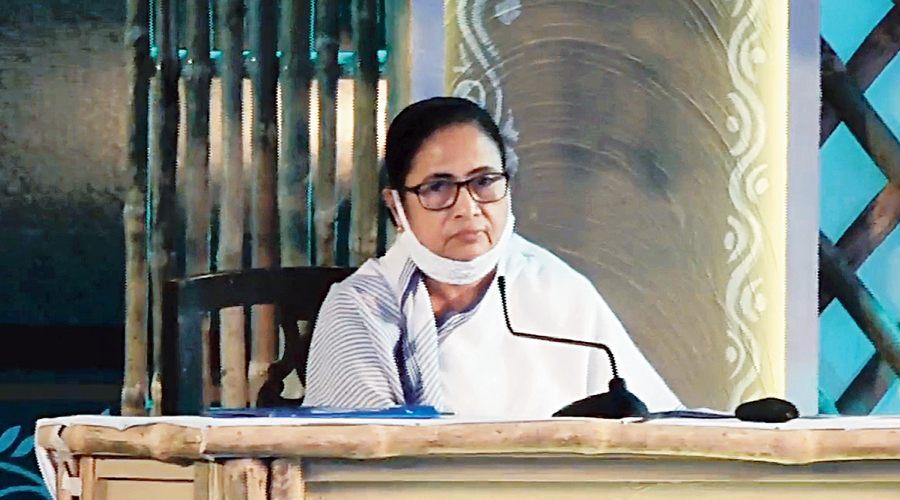Mamata Banerjee on Wednesday said the Duare Sarkar programme was the “third stage” of her government’s 500-odd district review meetings which she had conducted since the Trinamul Congress had come to power in 2011.
The chief minister’s clarification seemed to be aimed at countering the BJP’s narrative that the Bengal government had launched the reach-out to woo voters ahead of the Assembly polls.
“We are not doing it (providing services to people) today. When we came to power in 2011, we decided to hold review meetings in districts with all officials, ministers and line departments. We have already held 500 such meetings and Duare Sarkar was planned as the third stage based on the feedback we received during the meetings,” said the chief minister at a programme at a Nabanna auditorium.
It was not clear what the second stage of the programme was.
Bengal’s Opposition parties, especially the BJP, have been critical of the initiative saying the last minute reach-out programme by the government indicated that it didn’t deliver in the past 10 years. Mamata’s insistence that Duare Sarkar was a continuation of the administrative meetings was aimed at swatting away the charge.
During the one-hour-plus programme on Wednesday, some beneficiaries under government schemes accepted the scheme-related documents from the chief minister, who also launched the fifth phase of Duare Sarkar.
A select set of audience, including the diplomatic core in Calcutta, representatives of various multilateral organisations like the World Bank, UNDP and Unicef, and senior editors of both local and national media outfits, was present at the programme with whom the chief minister held a free-wheeling discussion.
After rolling out figures — like more than 2.5 crore people have visited the camps set up under the Duare Sarkar scheme — on the success of the scheme and its follow-up initiative, Parai Samadhan (solution at neighbourhood), the chief minister took care to explain why the programme had been launched.
“During the district review meetings, we realised that some people need support from the government and they need the support at their door steps. That is why the programme was launched,” said Mamata.
According to a government report, 76 lakh families were brought under the Swasthya Sathi scheme after they had applied through the Duare Sarkar camps. A total of 15.04 lakh people secured caste certificates through the camps and 11.18 lakh people got job cards under the 100 days’ work scheme through the camps.
Junaid Kamal Ahmad, the country head of World Bank, who attended the programme virtually, lauded the initiatives of the government saying those had helped people during the Covid-19 pandemic.
“According to our assessment, 95 per cent people in the state received at least one service from the government during the pandemic,” he said.
“This is highly appreciable.”
Indicating that she was not complacent with the accolades that Duare Sarkar initiative had drawn, the chief minister told officials that the follow-up of the applications received at the camps had to be carried out seriously so that the beneficiaries got the services they deserved.
The interaction on Wednesday afternoon, sources said, was part of Mamata’s strategy to bring the development issue to the centre-stage in the run up to the polls to take on the BJP’s narrative that they were all set to wrest the seat of power in Bengal.
“Our government has done so much of work for the people and even the multilateral agencies are recognising the efforts... This will help us to make development the main focus of the campaign,” said a source close to Mamata.











